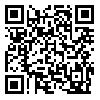Sun, Feb 15, 2026
| فارسی
Volume 26, Issue 4 (Winter 2021)
IJPCP 2021, 26(4): 432-447 |
Back to browse issues page
Download citation:
BibTeX | RIS | EndNote | Medlars | ProCite | Reference Manager | RefWorks
Send citation to:



BibTeX | RIS | EndNote | Medlars | ProCite | Reference Manager | RefWorks
Send citation to:
Babaei S, Asgharnejad Farid A A, Fathali Lavasani F, Birashk B. A comparative study on emotional regulation in males with internet addiction, food addiction, opioid dependence and normal peers. IJPCP 2021; 26 (4) :432-447
URL: http://ijpcp.iums.ac.ir/article-1-3069-en.html
URL: http://ijpcp.iums.ac.ir/article-1-3069-en.html
1- Department of Clinical Psychology, School of Behavioral Sciences and Mental Health (Tehran Institute of Psychiatry), Iran University of Medical Sciences, Tehran, Iran. , shirzadbabaei@gmail.com
2- Department of Clinical Psychology, School of Behavioral Sciences and Mental Health (Tehran Institute of Psychiatry), Iran University of Medical Sciences, Tehran, Iran.
2- Department of Clinical Psychology, School of Behavioral Sciences and Mental Health (Tehran Institute of Psychiatry), Iran University of Medical Sciences, Tehran, Iran.
Abstract: (4644 Views)
Objectives: Difficulty in emotional regulation is an important component in the pathology of different types of addiction and its evaluation can be helpful in understanding and treating these difficulties. The purpose of this study is to evaluate emotional regulation in people with opioid dependence (heroin and opium), food addiction, and internet addiction compared to normal people.
Methods: This is a causal- comparative study. Participants were 120 eligible male addicts selected using a purposive sampling method and divided into four groups of 30 including drug addiction, food addiction, internet addiction, and control. Semi-structured clinical interview for DSM-IV axis I disorders, Yale Food Addiction Scale, and Young’s Internet Addiction Test were used to diagnose the addictions. Then the Difficulties in Emotion Regulation Scale (DERS) was completed. Multivariate Analysis of Variance (MANOVA) was used to analyze the collected data.
Results: Overall DERS score and the score of its subscales were higher in all three addiction groups compared to the control group, and this difference was statistically significant (P<0.05). There was no significant difference between the three addiction groups in subscales of “unwillingness to accept certain emotional responses” and “difficulty engaging in goal-directed behavior”, but a significant difference between the three addiction groups was observed in subscales of “difficulty controlling impulse”, “lack of emotional awareness”, “lack of access to strategies”, “lack of emotional clarity”, and overall DERS score (P<0.05).
Conclusion: Men with opioid dependence, internet addiction and food addiction have more difficulties in emotional regulation compared to their normal peers. Emotional regulation ability in men with internet addiction is greater than in those with food and opioid addictions.
Methods: This is a causal- comparative study. Participants were 120 eligible male addicts selected using a purposive sampling method and divided into four groups of 30 including drug addiction, food addiction, internet addiction, and control. Semi-structured clinical interview for DSM-IV axis I disorders, Yale Food Addiction Scale, and Young’s Internet Addiction Test were used to diagnose the addictions. Then the Difficulties in Emotion Regulation Scale (DERS) was completed. Multivariate Analysis of Variance (MANOVA) was used to analyze the collected data.
Results: Overall DERS score and the score of its subscales were higher in all three addiction groups compared to the control group, and this difference was statistically significant (P<0.05). There was no significant difference between the three addiction groups in subscales of “unwillingness to accept certain emotional responses” and “difficulty engaging in goal-directed behavior”, but a significant difference between the three addiction groups was observed in subscales of “difficulty controlling impulse”, “lack of emotional awareness”, “lack of access to strategies”, “lack of emotional clarity”, and overall DERS score (P<0.05).
Conclusion: Men with opioid dependence, internet addiction and food addiction have more difficulties in emotional regulation compared to their normal peers. Emotional regulation ability in men with internet addiction is greater than in those with food and opioid addictions.
Type of Study: Original Research |
Subject:
Psychiatry and Psychology
Received: 2019/08/20 | Accepted: 2020/07/5 | Published: 2021/01/1
Received: 2019/08/20 | Accepted: 2020/07/5 | Published: 2021/01/1
| Rights and permissions | |
 |
This work is licensed under a Creative Commons Attribution-NonCommercial 4.0 International License. |






